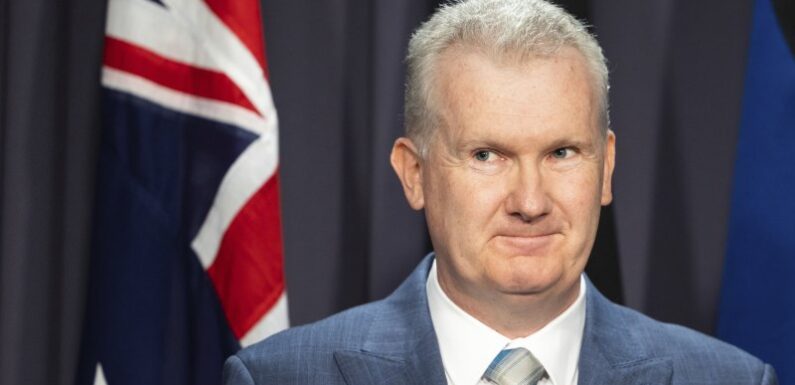
Save articles for later
Add articles to your saved list and come back to them any time.
Key posts
- Inflation tipped to fall while rent costs to buck trend with 15-year high
- Thousands of casuals could choose to become permanent employees under plan
- Millions of dollars in detention money went to Pacific politicians
-
1 of 1
Inflation tipped to fall while rent costs to buck trend with 15-year high
Inflation is poised to fall to its lowest level since 2021 as the Reserve Bank’s aggressive hikes in interest rates work through the economy, but evidence is growing that large numbers of renters are struggling and consumers are being forced to slash spending.
Analysts are expecting data being released this week to show rents growing at their fastest pace in 15 years, driven by the increasingly tight rental markets of Sydney and Melbourne, even as broader measures of cost of living start to ease.
The June quarter consumer price index result from the Australian Bureau of Statistics, to be released on Wednesday, will be pivotal to the RBA’s interest rate plans when it meets on August 1.
In Australia, inflation peaked at 7.8 per cent in the December quarter. Economists are expecting the June quarter to show prices up by about one per cent over the past three months, the best quarterly result since September 2021.
ANZ senior economist Adelaide Timbrell said she is expecting both headline and underlying measures of inflation to have eased, putting pressure on the Reserve Bank to keep interest rates steady.
“The RBA will likely take comfort that inflation appears to be falling in line with, or a touch faster, than its May forecasts,” she said.
“While the August meeting is live, an inflation outcome around our forecast would support our expectation that, on balance, an extended pause from the RBA is now most likely.”
Read the full article here.
Thousands of casuals could choose to become permanent employees under plan
More than 850,000 casual workers on regular hours will gain the right to become permanent employees under a Labor plan that aims to stop employers “double-dipping” by hiring a reliable workforce but not paying entitlements.
The federal government plans to close a legal loophole by legislating a definition of casual workers that will be tied to whether they work regular or irregular hours and have advanced notice of their shifts.
Minister for Employment and Workplace Relations Tony Burke.Credit: Alex Ellinghausen
The workplace reform acts on Labor’s election promise to introduce an objective test for classifying casual workers and reverses the former Coalition government’s reforms, which defined casual workers based on their job description.
About 850,000 casual workers who have regular hours will be eligible for permanency, and can choose to give up their casual loading rates in exchange for sick pay and holiday leave. Workers won’t receive any backpay, and they won’t be forced to convert from casual to permanent if they don’t want to.
Workplace Relations Minister Tony Burke will tell an audience at the Sydney Institute on Monday that some employers are double-dipping, while there are casual employees on permanent hours who “desperately want security”.
“Many casuals won’t want a permanent job. If you’re a student or just working a casual job to make some extra money, this change won’t matter to you. But there are casual workers who are trying to support households,” Burke will say, according to excerpts of his speech.
Read the full article here.
Millions of dollars in detention money went to Pacific politicians
Australia’s Home Affairs Department oversaw the payment of millions of taxpayer dollars to powerful Pacific Island politicians through a chain of suspect contracts as it sought to maintain controversial offshore asylum seeker processing centres.
Financial data, internal emails and whistleblower testimony implicate Home Affairs’ lead contractors – Broadspectrum, Canstruct and Paladin – in suspected systemic misuse of taxpayer dollars in Nauru and Papua New Guinea.
The Australian Federal Police and financial crime agency Austrac have spent months probing the payments. But no charges have been laid, and sources aware of both agencies’ work, speaking anonymously to detail confidential investigations, said the National Anti-Corruption Commission or a commission of inquiry was needed to examine a money trail that spans 10 years and several governments.
Read the full investigation here.
This morning’s headlines at a glance
Good morning, and thanks for your company.
It’s Monday, July 24. I’m Ashleigh McMillan, and I’ll be anchoring our live coverage for the first half of the day.
Here’s what you need to know before we get started:
- Australia’s Department of Home Affairs oversaw the payment of millions of taxpayer dollars to powerful Pacific Island politicians through a chain of suspect contracts.
- Inflation is poised to fall to its lowest level since 2021 as the Reserve Bank’s aggressive hikes in interest rates work through the economy, but evidence is growing that large numbers of renters are struggling.
- More than 850,000 casual workers on regular hours will gain the right to become permanent employees under a new Labor plan.
- The European Union’s most senior diplomat is confident Australia and Europe will end their impasse and strike a trade deal that will allow each to diversify their economies and reduce dependence on China.
- Australia retained the Ashes with a washed out draw in the fourth Test at Old Trafford on Sunday.
-
1 of 1
Most Viewed in National
Source: Read Full Article
